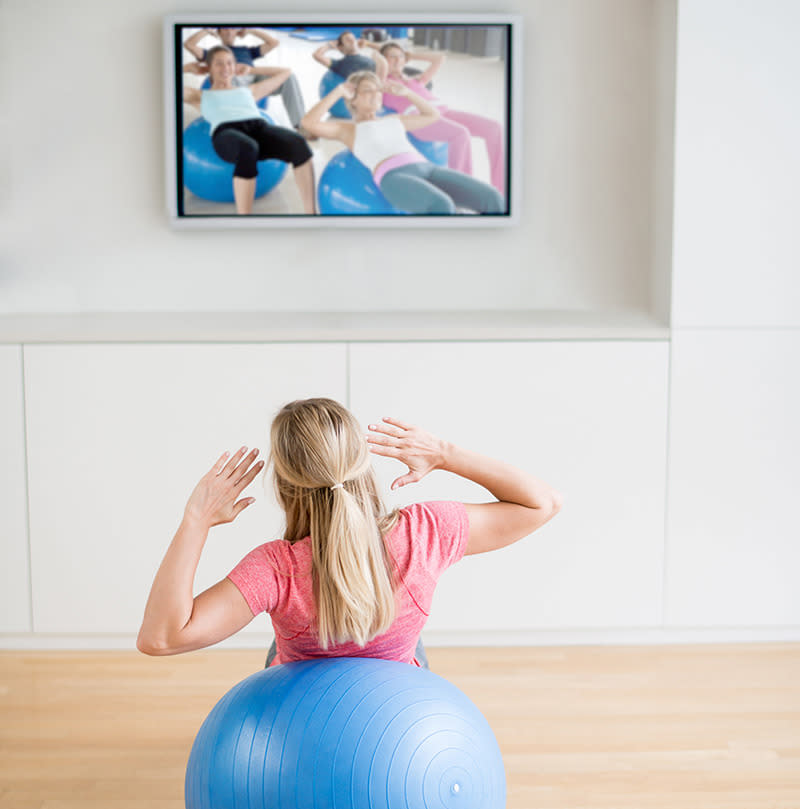Why Exercise DVDs Can Be Bad for You

That quick at-home workout isn’t all it’s cracked up to be. (Photo: Getty Images)
We spend $250 million a year on fitness DVDs, but new research has found they might have a negative impact on our health.
A recent study of 10 commercially available exercise DVDs published in Sociology of Sport Journal found that the DVDs can create an unrealistic body image, and even cause viewers to want to exercise less. Researchers also discovered that an average of one in seven motivational statements made by the instructor were demotivating, and could even cause psychological harm.
Among the “motivational” statements deemed negative:
“Say hello to your sexy six-pack”
“You better be sweating”
“You should be dying right now”
In addition, researchers found that most of the instructors were slim, female, and white, and wore revealing clothes.
Related: The Popular Fitness DVDs That Got Eminem Back Into Shape
That sends a subtle message about what people who are fit should look like, lead study author Brad Cardinal, PhD, a kinesiology professor at Oregon State University, tells Yahoo Health. If exercisers don’t look like that, they may become disheartened.
Doug Sklar, a certified personal trainer and founder of New York City-based fitness training studio PhilanthroFIT, tells Yahoo Health that the findings “don’t surprise me at all.”
Workout DVDs are often targeted toward exercise beginners, he says, and typically promise quick, easy fixes like guaranteeing that a user will lose 20 pounds in three weeks, just by exercising for 10 minutes a day. As a result, the user may feel like they’ve failed and be more likely to quit if the unrealistic claims don’t come true.
Related: 10 Ways to Burn 1,000 Calories And Not Even Realize It
While the negative statements, which usually make exercise seem painful or torturous, can motivate more experienced exercisers, they can be harmful for beginners because they create a negative association with working out, Sklar says. “Exercise does require challenge to promote changes within the body, but it is important to encourage and support those new to exercise so they find it to be a positive experience that they are more likely to continue with,” he adds.
Cardinal says his team found a range in terms of motivational comments — for some DVDs, only seven percent of the comments made were motivational. That went up to 50 percent for others, but he found that the average was 25 percent. “Some of the language was pretty harsh and wasn’t motivational at all,” he says.
Related: Blake Lively’s Slim Down Secrets
Those messages can make a big impact, especially given that they’re coming from an authority figure, exercise psychologist Nicole Detling, PhD, tells Yahoo Health. “If you feel you are not living up to the standards set by an authoritative figure whose opinion is valued by you, that leads to negative self-talk, which then leads to negative self-image,” she says.
As for their appearance, Sklar points out that most trainers didn’t get their bodies by doing the workouts on the DVD. “However, workout DVDs use these images and people as part of their marketing, with the implication being that ‘if you do my workout, you’ll look just like me,’” he says. And, when that doesn’t happen, it can turn people off exercise entirely.
So, should you avoid fitness DVDs entirely? Not necessarily, since Sklar points out that they can be beneficial for people who don’t have access to a gym or are pressed for time.
Cardinal can’t reveal the specific DVDs he analyzed, but says DVDs with instructors who have certification, like a certified personal trainer, may be more realistic and beneficial than those led by someone who just happens to have a great body.
And, if you plan to use one, Sklar simply recommends doing so with the right mindset and realistic goals… and ignoring the DVD’s marketing promises.
Let’s keep in touch! Follow Yahoo Health on Facebook, Twitter, Instagram, and Pinterest.

